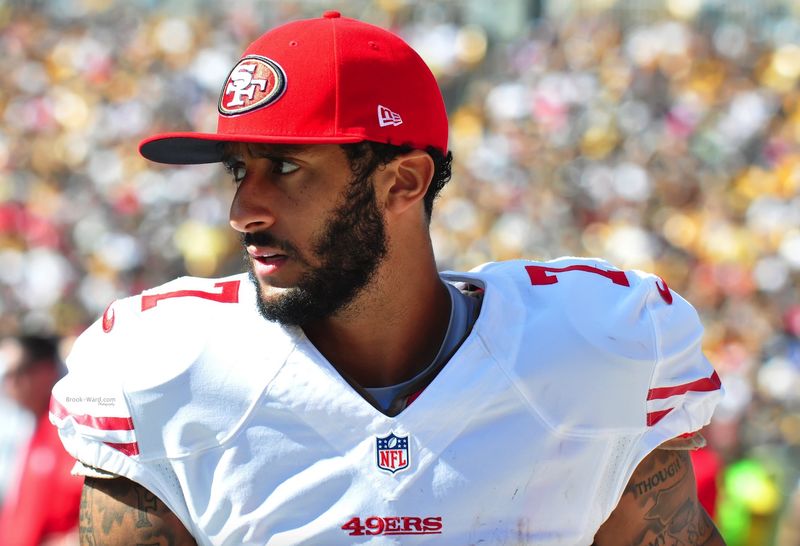Kaepernick and Media Coverage

thearcmag.com
Kaepernick and Media Coverage
Tito Hernandez
We’ve come a long way since Charles Barkley said, “I’m not a role model."
The Colin Kaepernick incident — in which Kaepernick decided to sit during the national anthem due to the oppression experienced by African Americans and others — has caused a lot of controversy, especially among conservative critics, who believe that the embattled San Francisco 49ers quarterback is a figurehead of American citizens who dishonor the flag and the country it represents.
Consider Texas Senator Ted Cruz, who attacked President Barack Obama on Tuesday, suggesting that Obama was actually encouraging Kaepernick, a “rich, spoiled athlete" to “disrespect" the flag.
Or see The Blaze anchor Tomi Lahren, who criticized Kaepernick not once, not twice, but six times by featuring him in her Facebook-shareable “final thoughts." (A touchdown is six points — we see what you did there, Tomi.)
On the other hand, in light of sit-gate, Kaepernick has become a darling of left-leaning media, with The Nation and the New York Daily News coming to his defense, to name two outlets of many who supported Kaepernick’s actions. What conservative critics miss, according to the two outlets above, is the substance of Kaepernick’s critique, which focuses on the mistreatment African Americans (and other people of color) endure at the hands of a law and order superstructure which oppresses them at various points. Kaepernick alludes to police brutality, but the criticism can extend to the mass incarceration of African Americans facilitated by a prison-industrial system designed to achieve those results.
“There are bodies in the street and people getting paid leave and getting away with murder," Kaepernick said before a preseason loss against the Green Bay Packers on August 26.
Kaepernick has received praise for sitting during the national anthem, a decision at odds with other athletes who, when faced with the opportunity to comment on socially significant conversations, tend to opt out as quickly as possible. There are few aspects to Michael Jordan’s legacy we might call ignominious, but his “silence" during his playing days is considered one of them. Jordan himself penned an essay for ESPN’s The Undefeated, lamenting over his failure to speak out in the past and suggesting that he can no longer stay silent.
Yet Kaepernick has not been the only athlete to speak out social issues; he is, however, one of the few whose actions and comments have generated lots of attention.
Benjamin Watson is a tight end who plays for the Baltimore Ravens, although he won’t feature this season due to suffering a torn Achilles tendon which ended his season on August 27. Watson has been speaking out about the mistreatment of African Americans since the Michael Brown police-realted shooting in Ferguson, Missouri caused protests to erupt in the city’s streets for months. He wrote an essay on the issue on his Facebook account, while also speaking up for religious freedom and offering his view that America is no longer a Christian nation.
But when Watson chose to address the issue of abortion, saying on August 7 that the “the idea with Planned Parenthood and [Margaret] Sanger in the past was to exterminate blacks," his comments barely received any media attention.
“It’s like when black girls are pregnant, it’s like a statistic, but when white girls get pregnant, they get a TV show," Watson said during his interview with the Turning Point Pregnancy Resource Center.
A simple Google search reveals that the only major media coverage this story received was from CBS Sports. It’s almost as if his words were never uttered.
The question is: Who gets to decide which story is a worthy social justice cause?
African Americans make up 12.6% of the United States population, according to 2010 census data, while the Center for Disease Control and Prevention reports that black women accounted for 35.4% of U.S. abortions in 2009. Data from The Guttmacher Institute shows that Hispanic women accounted for 25% of U.S. abortions in 2008, although Hispanics made up 16.3% of the U.S. population. In 2008, the total number of abortions was 1,212,350.
When it comes to the issue of police-related killings, ThinkProgress concludes that in 2015, 1,186 people were killed by police.
Looking purely at the numbers, shouldn’t the issue Watson has chosen to shine a light on get more media play?
Sometimes it is thought that bias involves skewing a story in a particular direction. That’s not under dispute. But there’s another kind of bias, less perceptible but arguably more intellectually destructive, which occurs when the media underreports or flat out fails to report on matters deemed morally insignificant according to the ideological preferences of those who populate the field. This, too, is bias.
Benjamin Watson is a black man speaking out against racial oppression from police brutality as well as from abortion.
But his commentary on abortion went ignored.
The advent of conservative media is thus not a mystery. When mainstream outlets don’t just slant coverage but make coverage-selection decisions that result in the underreporting of issues meaningful to conservatives, it’s no wonder a market emerges for coverage aligned with conservative priorities. To be sure, this has led to all manner of hackery on the right — What I’m arguing, though, is that this is largely brought on by the failure of left-leaning media to, for example, deem Benjamin Watson’s comments worthy of reflection.
The numbers are there. The issue is contentious. Why didn’t it get more play?


